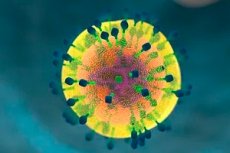New publications
The immunodeficiency virus is sensitive to hydrogen sulfide
Last reviewed: 02.07.2025

All iLive content is medically reviewed or fact checked to ensure as much factual accuracy as possible.
We have strict sourcing guidelines and only link to reputable media sites, academic research institutions and, whenever possible, medically peer reviewed studies. Note that the numbers in parentheses ([1], [2], etc.) are clickable links to these studies.
If you feel that any of our content is inaccurate, out-of-date, or otherwise questionable, please select it and press Ctrl + Enter.

Hydrogen sulfide has been found to suppress oxidative stress and inflammation that occur during antiretroviral treatment, which helps control HIV.
To block HIV, doctors use special antiretroviral treatment, which consists of the simultaneous administration of multidirectional medications that suppress different viral proteins, which slows down the reproduction of the infectious agent. Retroviruses are non-cellular microorganisms that can be included in the cell genome. Often, under the influence of therapy, HIV simply "hides" inside the genome, its genes are deactivated, new proteins and infectious particles are not formed.
But there are situations when this scheme is violated, and the virus does not want to "hide". In addition, antiretroviral therapy is often accompanied by adverse side effects: the cell begins to accumulate toxins, oxidative stress processes increase, which subsequently leads to the development of severe inflammation with damage to internal organs.
Scientists have long been working to improve HIV treatment. It was important to find a drug that would allow a break in antiretroviral therapy without fear of renewed activity of the infectious agent. And recently, such a remedy was presented by Indian specialists - it turned out to be hydrogen sulfide, a well-known toxic gas with a characteristic rotten egg aroma caused by organic decay processes. Few people know that our body contains small amounts of hydrogen sulfide - inside cells and tissues, during most biological and chemical reactions. For example, hydrogen sulfide is necessary to mitigate oxidative stress and reduce the number of active oxygen species.
Experts note that when the immunodeficiency virus activity resumes, the activity of the enzyme responsible for hydrogen sulfide levels inside cells is sharply reduced. When this enzyme activity is artificially suppressed, the oxidative balance is disrupted, gene function changes, and HIV is activated. The reverse process is also possible: when the hydrogen sulfide content in the cell increases, viral activity is suppressed and its reproduction is inhibited. The exact mechanism of action of hydrogen sulfide is as follows: when it appears, an impulse pathway inside the cell opens, which protects the structure from oxidative stress. At the same time, the activity of the proinflammatory protein is closed, and a protein substance that maintains their "sleep" is attached to the DNA near the virus genes. Thus, hydrogen sulfide has a multifaceted effect, restraining the immunodeficiency virus. At this stage, experts are developing drugs that can complement or even replace antiretroviral treatment, which will significantly improve the prognosis for HIV patients.
Full details are available in the source – eLife magazine
